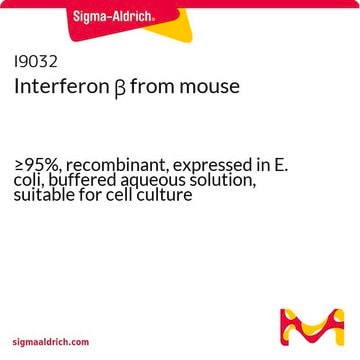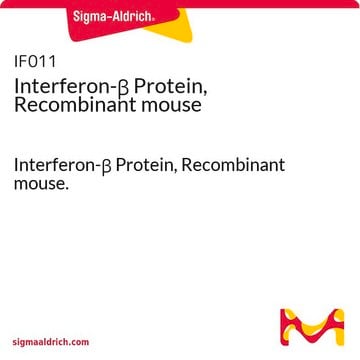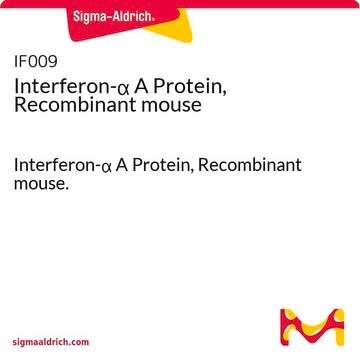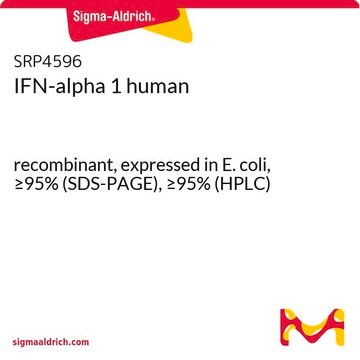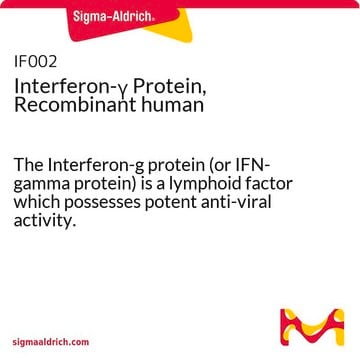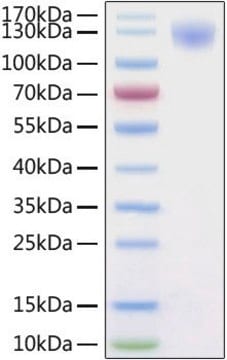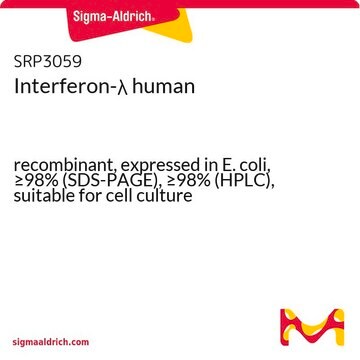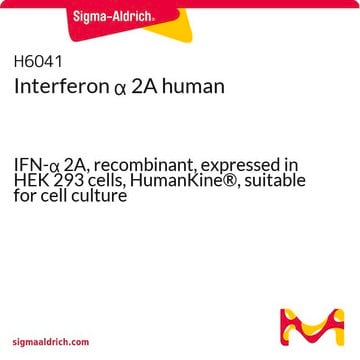IF014
Interferon-β Protein, Recombinant human
Recombinant Human Interferon Beta 1a (Hu-IFNbeta 1a).
Synonym(s):
Fibroblast Interferon
Sign Into View Organizational & Contract Pricing
All Photos(1)
About This Item
UNSPSC Code:
12352202
eCl@ss:
32160405
NACRES:
NA.77
Recommended Products
biological source
human
Quality Level
recombinant
expressed in CHO cells
Assay
≥95% (one N-glycosylation site)
form
liquid
specific activity
3.99 x 108 U/mg
manufacturer/tradename
Chemicon®
concentration
1 x 106 units/mL
technique(s)
cell culture | mammalian: suitable
NCBI accession no.
UniProt accession no.
shipped in
dry ice
General description
Product Source: cDNA obtained from human fibroblast mRNA expressed in CHO cells.
Recombinant Human Interferon Beta 1a (Hu-IFNbeta 1a). Molecular weight is ~23 kDa.
Linkage
Replaces: IF008
Physical form
Frozen liquid in 50 mM NaOAc, pH 5.5, containing 0.1% BSA.
Storage and Stability
After receipt, this product should be kept at -70°C or below for retention of full activity.
Thaw product vial by incubation cold tap water until just thawed. Thawed IFNβ should be
stored in working aliquots at -70°C for up to six months. Avoid multiple freeze/thaw cycles.
Refreezing should be done on dry ice or in a dry ice/alcohol bath. Further dilution of the
product should be in buffers containing protein such as 0.1% bovine serum albumin (BSA).
Thaw product vial by incubation cold tap water until just thawed. Thawed IFNβ should be
stored in working aliquots at -70°C for up to six months. Avoid multiple freeze/thaw cycles.
Refreezing should be done on dry ice or in a dry ice/alcohol bath. Further dilution of the
product should be in buffers containing protein such as 0.1% bovine serum albumin (BSA).
Analysis Note
Specific Activity: Determined by assaying inhibition of virus-induced cytopathic effect.In this antiviral assay for interferon, about 1 unit/ml of interferon is the quantity necessary to produce a cytopathic effect of 50%.The units are determined with respect to the international reference standard for human interferon beta (Hu-IFNbeta) provided by the National Institutes of Health.Unit of activity measured on VERO cells with vesicular stomatitis virus (VSV).
Legal Information
CHEMICON is a registered trademark of Merck KGaA, Darmstadt, Germany
Disclaimer
Unless otherwise stated in our catalog or other company documentation accompanying the product(s), our products are intended for research use only and are not to be used for any other purpose, which includes but is not limited to, unauthorized commercial uses, in vitro diagnostic uses, ex vivo or in vivo therapeutic uses or any type of consumption or application to humans or animals.
Storage Class Code
12 - Non Combustible Liquids
WGK
WGK 1
Flash Point(F)
Not applicable
Flash Point(C)
Not applicable
Certificates of Analysis (COA)
Search for Certificates of Analysis (COA) by entering the products Lot/Batch Number. Lot and Batch Numbers can be found on a product’s label following the words ‘Lot’ or ‘Batch’.
Already Own This Product?
Find documentation for the products that you have recently purchased in the Document Library.
Customers Also Viewed
Colton R Martens et al.
PLoS pathogens, 18(2), e1010342-e1010342 (2022-02-23)
Viral infection of the heart is a common but underappreciated cause of heart failure. Viruses can cause direct cardiac damage by lysing infected cardiomyocytes. Inflammatory immune responses that limit viral replication can also indirectly cause damage during infection, making regulatory
Fanning Zeng et al.
Cells, 9(12) (2020-12-10)
Genetic knock-in using homology-directed repair is an inefficient process, requiring the selection of few modified cells and hindering its application to primary cells. Here, we describe Homology independent gene Tagging (HiTag), a method to tag a protein of interest by
Zhaowei Chu et al.
Nature communications, 13(1), 1859-1859 (2022-04-08)
The cohesin complex participates in the organization of 3D genome through generating and maintaining DNA loops. Stromal antigen 2 (STAG2), a core subunit of the cohesin complex, is frequently mutated in various cancers. However, the impact of STAG2 inactivation on
Sarah Aref et al.
Molecular therapy : the journal of the American Society of Gene Therapy, 28(4), 1043-1055 (2020-02-23)
The mechanism of tumor-selective replication of oncolytic measles virus (MV) is poorly understood. Using a stepwise model of cellular transformation, in which oncogenic hits were additively expressed in human bone marrow-derived mesenchymal stromal cells, we show that MV-induced oncolysis increased
Juan A Pérez-Bermejo et al.
bioRxiv : the preprint server for biology (2020-09-17)
Although COVID-19 causes cardiac dysfunction in up to 25% of patients, its pathogenesis remains unclear. Exposure of human iPSC-derived heart cells to SARS-CoV-2 revealed productive infection and robust transcriptomic and morphological signatures of damage, particularly in cardiomyocytes. Transcriptomic disruption of
Our team of scientists has experience in all areas of research including Life Science, Material Science, Chemical Synthesis, Chromatography, Analytical and many others.
Contact Technical Service